
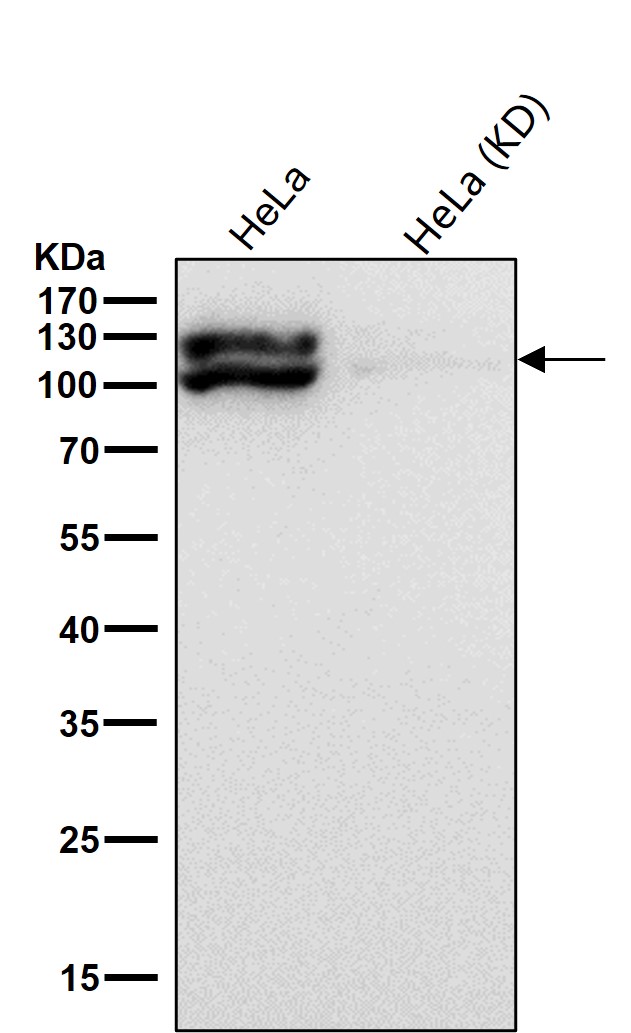
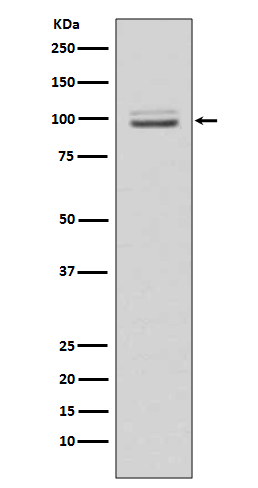
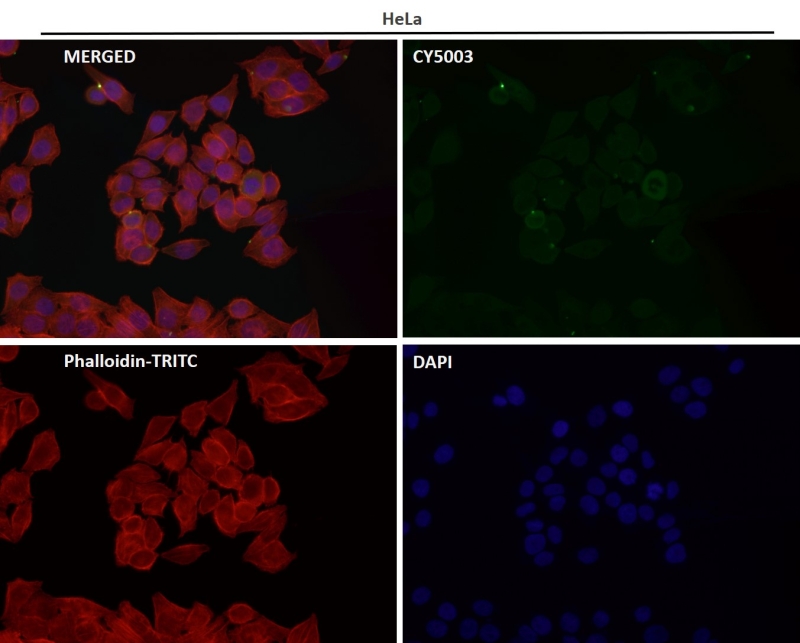
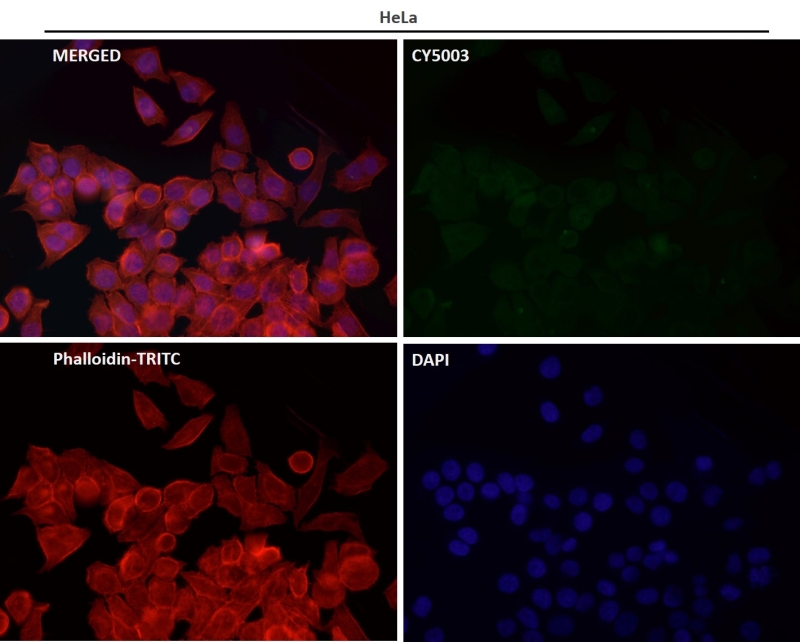
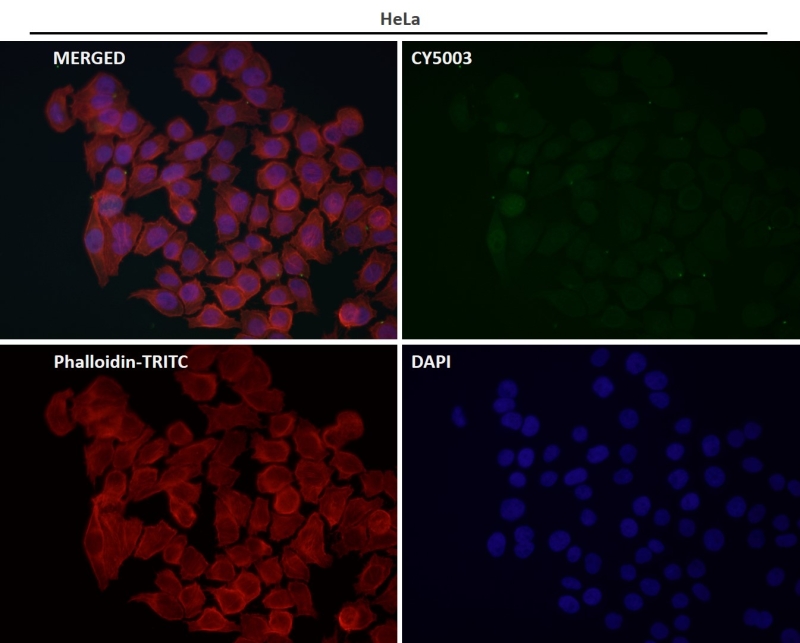
| WB | 咨询技术 | Human,Mouse,Rat |
| IF | 咨询技术 | Human,Mouse,Rat |
| IHC | 咨询技术 | Human,Mouse,Rat |
| ICC | 1/50-1/200 | Human,Mouse,Rat |
| FCM | 咨询技术 | Human,Mouse,Rat |
| Elisa | 咨询技术 | Human,Mouse,Rat |
| Aliases | CHO 1;CHO1;KIF 23;KIF23;;KNS L5;KNSL 5;KNSL5;Mitotic kinesin like 1;Mitotic kinesin like protein 1;MKLP 1;;KIF23 |
| WB Predicted band size | Calculated MW: 110 kDa ; Observed MW: 98 kDa |
| Host/Isotype | Rabbit IgG |
| Antibody Type | Primary antibody |
| Storage | Store at 4°C short term. Aliquot and store at -20°C long term. Avoid freeze/thaw cycles. |
| Species Reactivity | Human,Mouse,Rat |
| Immunogen | A synthesized peptide derived from human KIF23 |
| Formulation | Purified antibody in PBS with 0.05% sodium azide,0.05% BSA and 50% glycerol. |
+ +
以下是3篇关于MKLP1抗体的参考文献及其摘要概括:
---
1. **文献名称**: "MKLP1. a novel microtubule-activated ATPase"
**作者**: Nislow, C., et al.
**摘要**: 该研究首次从海星卵中纯化并鉴定了MKLP1蛋白,利用特异性抗体证实其在有丝分裂纺锤体中的定位。研究揭示了MKLP1通过微管依赖的ATP酶活性参与中晚期纺锤体动力学调控。
2. **文献名称**: "The kinesin-like protein MKLP1 is essential for cytokinesis in human cells"
**作者**: Gruneberg, U., et al.
**摘要**: 通过RNA干扰和MKLP1抗体免疫荧光实验,证明MKLP1缺失导致胞质分裂失败,形成多核细胞。研究强调了MKLP1在维持中心纺锤体结构和调控分裂沟形成中的必要性。
3. **文献名称**: "Phosphorylation of MKLP1 by Aurora B regulates midzone organization and cytokinesis"
**作者**: Kurasawa, Y., et al.
**摘要**: 利用MKLP1特异性抗体进行免疫沉淀和质谱分析,发现Aurora B激酶磷酸化MKLP1的Thr-937位点,调控其与PRC1的结合及中心纺锤体稳定性,从而影响胞质分裂进程。
---
这些研究均通过MKLP1抗体开展蛋白定位、功能验证或互作机制分析,聚焦于其在细胞分裂中的核心作用。
The MKLP1 (Mitotic Kinesin-Like Protein 1) antibody is a tool used to detect and study the MKLP1 protein, a member of the kinesin superfamily involved in cell division. MKLP1. also known as KIF23. plays a critical role in cytokinesis by facilitating the formation and constriction of the midbody, a transient structure essential for separating daughter cells during mitosis. It interacts with the centralspindlin complex, contributing to microtubule organization and ensuring proper chromosomal segregation. Dysregulation of MKLP1 has been linked to mitotic errors, genomic instability, and diseases such as cancer, making it a target for studying tumorigenesis and therapeutic strategies.
Antibodies against MKLP1 are widely used in cell biology research to visualize its localization (e.g., midbody staining via immunofluorescence) or quantify _expression (e.g., Western blotting). They help investigate MKLP1's functional roles in cell cycle regulation, its interaction partners, and its potential as a biomarker. These antibodies are typically raised in hosts like rabbits or mice, available as monoclonal or polyclonal versions. Validation steps, including knockout controls and functional assays, ensure specificity. Researchers also utilize MKLP1 inhibitors or siRNA alongside antibodies to explore its mechanistic contributions to mitosis, cancer progression, and drug resistance.
×